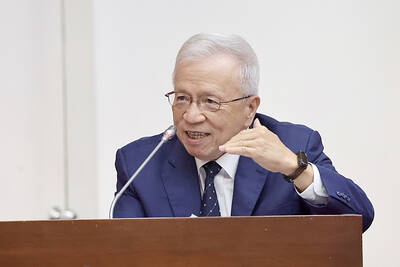Housing transactions in Taiwan’s six special municipalities last month shrank 8 percent from a month earlier as loan restrictions appeared to bear fruit in slowing the market, real-estate brokerages said on Monday.
Deals totaled 24,527 units in the six special municipalities of Taipei, New Taipei City, Taoyuan, Taichung, Tainan and Kaohsiung, brokerages said, citing data from local land administrations.
On an annual basis, transactions in the six regions rose 21 percent from a year earlier, the data showed.

Photo: Hsu Yi-ping, Taipei Times
Sinyi Realty Inc (信義房屋) attributed the month-on-month decline to a cash crunch as banks slow or shun mortgage applications to comply with a rule to keep home and construction loans at 30 percent of their deposits and debt issuance combined.
The self-imposed restrictions took effect after the central bank last month asked lenders to submit quantitative control measures by the end of this week detailing how they would limit mortgages without affecting urban renewal projects or first homes for self-occupancy.
As of June 30, real-estate lending — including for renovations — had approached 37.43 percent of total loans, the central bank said last week.
Deals in Taichung tumbled 16 percent monthly to 4,996 units, while in Taipei they fell 13 percent to 2,560 units, government data showed.
Transactions in New Taipei City and Taoyuan softened 4 percent and 5 percent to 5,747 units and 4,727 units respectively, while in Kaohsiung they slipped 8 percent to 3,987 units, the data showed.
Tainan bucked the trend with an 8 percent monthly increase to 2,510 units, the data showed.
Mortgage applications take several months, compared with one month previously, and some banks charge interest rates of 3 percent, compared with 1.775 percent for first homes.
Other banks are turning down new mortgage applications altogether to avoid riling the central bank, which might introduce new credit controls on Sept. 19 if loans grow unchecked.
The cash crunch has stirred unease among home buyers and prompted President William Lai (賴清德) to suggest in an interview that lenders should not overreact.
Lai’s campaign promise to help people buy their first home through interest subsidies and other favorable lending terms is widely believed to have revived a housing boom and propelled house loans.
Central bank Governor Yang Chin-long (楊金龍) on Monday met with bank presidents, telling them that eight state-run lenders have NT$800 billion (US$24.95 billion) on hand for mortgages.
The Financial Supervisory Commission yesterday said that real-estate lending stood at 26.47 percent of overall deposits, meaning there is room for more mortgages.
An uptick of 1 percentage point would release NT$558.5 billion based on the system’s total deposits of NT$55.85 trillion, the commission said, urging banks to expedite loan considerations for people seeking to buy their first home.

JITTERS: Nexperia has a 20 percent market share for chips powering simpler features such as window controls, and changing supply chains could take years European carmakers are looking into ways to scratch components made with parts from China, spooked by deepening geopolitical spats playing out through chipmaker Nexperia BV and Beijing’s export controls on rare earths. To protect operations from trade ructions, several automakers are pushing major suppliers to find permanent alternatives to Chinese semiconductors, people familiar with the matter said. The industry is considering broader changes to its supply chain to adapt to shifting geopolitics, Europe’s main suppliers lobby CLEPA head Matthias Zink said. “We had some indications already — questions like: ‘How can you supply me without this dependency on China?’” Zink, who also

At least US$50 million for the freedom of an Emirati sheikh: That is the king’s ransom paid two weeks ago to militants linked to al-Qaeda who are pushing to topple the Malian government and impose Islamic law. Alongside a crippling fuel blockade, the Group for the Support of Islam and Muslims (JNIM) has made kidnapping wealthy foreigners for a ransom a pillar of its strategy of “economic jihad.” Its goal: Oust the junta, which has struggled to contain Mali’s decade-long insurgency since taking power following back-to-back coups in 2020 and 2021, by scaring away investors and paralyzing the west African country’s economy.

BUST FEARS: While a KMT legislator asked if an AI bubble could affect Taiwan, the DGBAS minister said the sector appears on track to continue growing The local property market has cooled down moderately following a series of credit control measures designed to contain speculation, the central bank said yesterday, while remaining tight-lipped about potential rule relaxations. Lawmakers in a meeting of the legislature’s Finance Committee voiced concerns to central bank officials that the credit control measures have adversely affected the government’s tax income and small and medium-sized property developers, with limited positive effects. Housing prices have been climbing since 2016, even when the central bank imposed its first set of control measures in 2020, Chinese Nationalist Party (KMT) Legislator Lo Ting-wei (羅廷瑋) said. “Since the second half of

AI BOOST: Next year, the cloud and networking product business is expected to remain a key revenue pillar for the company, Hon Hai chairman Young Liu said Manufacturing giant Hon Hai Precision Industry Co (鴻海精密) yesterday posted its best third-quarter profit in the company’s history, backed by strong demand for artificial intelligence (AI) servers. Net profit expanded 17 percent annually to NT$57.67 billion (US$1.86 billion) from NT$44.36 billion, the company said. On a quarterly basis, net profit soared 30 percent from NT$44.36 billion, it said. Hon Hai, which is Apple Inc’s primary iPhone assembler and makes servers powered by Nvidia Corp’s AI accelerators, said earnings per share expanded to NT$4.15 from NT$3.55 a year earlier and NT$3.19 in the second quarter. Gross margin improved to 6.35 percent,